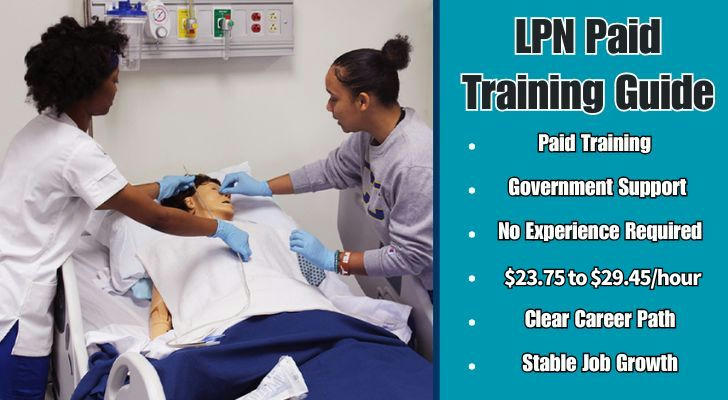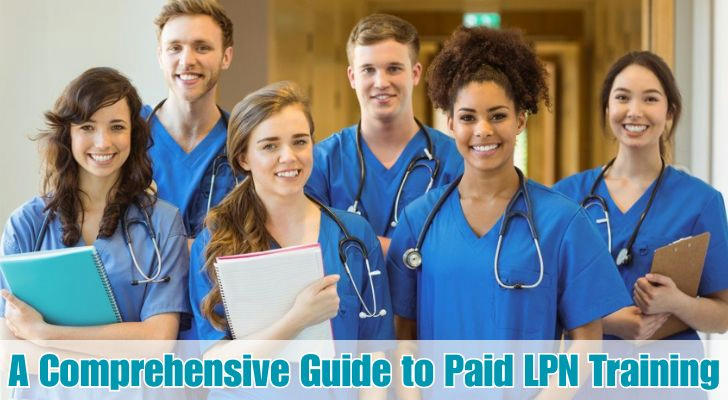Government-supported Licensed Practical Nurse (LPN) programs — Super Detailed Guide
📢 Apprenticeship Program + Government Support + No Experience Required
Are you thinking about pursuing a career in healthcare but are still hesitant? There are government-supported Licensed Practical Nurse (LPN) programs throughout the U.S. that pay up to $23.75 to $29.45/hour during training.(BLS)

Why Choose LPN training?
💵 Earn While You Learn: Many trainings offer earn-while-you-learn opportunities, with wages increasing as your skills improve.
🎓 Low Entry Barrier: Most programs accept applicants with a high school diploma or GED.
📊 High Demand: LPNs are in demand across hospitals, long-term care, and home health settings.
🩺 Hands-On Learning: Gain real-world nursing skills under the supervision of RNs and clinical mentors.
📜 Valid Path to Licensure: Training is aligned with NCLEX-PN examination and licensing requirements.
📈 Stable Job Growth: Around 54,000 LPN job openings are expected annually over the next decade.
🔄 Clear Career Path: LPN experience can lead to becoming an RN or earning a BSN.
2025 LPN Salary Comparison by Top Employment States
| State | Apprentice hourly wage | Experienced salary | Annual Employment (BLS Estimate) | Regional Highlights |
|---|---|---|---|---|
| California | $20-30/hr | $36.82/hr | 71,320 | Highest LPN salaries in the U.S. with broad job availability |
| Texas | $16-24/hr | $27.16/hr | 64,870 | Abundant healthcare facilities with strong job growth |
| Florida | $17-25/hr | $27.47/hr | 49,490 | Aging population drives steady LPN demand |
| New York | $18-26/hr | $30.30/hr | 43,620 | Strong benefits and dense urban healthcare systems |
💰 Those with CNA experience or certification can earn higher salaries.
✔️ Nurses work in a variety of settings, including nursing facilities, nursing homes, hospitals, clinics, and private homes. Most nurses work full-time.
✅ What Government Support And Scholarships Are Available?
The U.S. federal and state governments provide a wealth of funding and exemption mechanisms for LPN students:
🏛️ Federal Financial Aid (via FAFSA)
- Pell Grants (based on family income)
- Subsidized and unsubsidized federal loans
- Work-Study job opportunities
🎓 Special Nursing Scholarships
- Nurse Corps Scholarship Program (HRSA)
- Pays tuition + stipend for service in high-need areas
- State-based grants (like Cal Grant or NY TAP)
🏥 Tuition Help from Employers
- Many healthcare facilities offer tuition reimbursement
- Some provide LPN training in exchange for post-grad employment
How to Apply for Paid LPN Training
Experts have compiled a wealth of information to help you find the right training. For example: [paid LPN training], [fast LPN training]...
1️⃣ Find a Registered LPN Apprenticeship : Use resources like CareerOneStop, state DOL websites, or union programs.
2️⃣ Prepare Your Application : High school diploma or GED usually required. Resume and basic background check.
3️⃣ Interview with Program Providers or Employers : Some programs are employer-based (e.g., hospitals, nursing homes).
4️⃣ Enroll & Begin Paid Training : Study, train and work according to the employer's requirements.
5️⃣ Complete Training & Take the NCLEX-PN :Finish in 12–18 months, then test for LPN licensure.
Who Should Consider It?
👧 18–25 - Ideal for early-career starters seeking a healthcare path.
👱 26–35 - Great for career changers balancing job + study.
👩 36–50 - Offers work-life flexibility and stability.
🧓 51–65+ - Opportunity to secure income and healthcare benefits.
LPN Job Responsibilities
Monitor vital signs and assist with medications and basic care.
Support daily activities like hygiene, mobility, and feeding.
Perform injections and wound care under RN or doctor supervision.
Observe and report patient condition changes.
Maintain records and help explain care plans to patients.
❓ Paid LPN Training – FAQs
Q: Do I need to go to college first?
A: No. These programs typically replace traditional college with employer-led training.
Q: Will I need to pay tuition?
A: In most cases, tuition is covered by your employer, union, or workforce funding.
Q: How long does it take to become a licensed LPN?
A: Most paid training takes 12-18 months, followed by the NCLEX-PN exam.
Q: Will I be hired after the program?
A: Many trainings come with guaranteed employment opportunities upon completion.⚠️ Typical service commitment for paid LPN training is 1–2 years, with possible penalties for early exit.
The first step into your LPN career!
Whether you're entering the healthcare field for the first time or seeking a more stable career, paid LPN training offers a pathway with strong job security, real-time earnings, and opportunities for advancement. With support from recognized institutions and flexible options, it’s a career choice that fits real lives. Don’t miss the opportunity!

